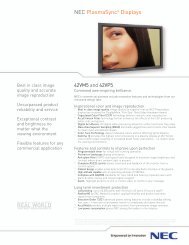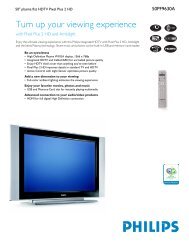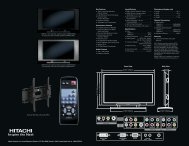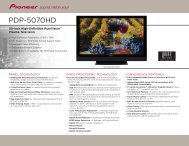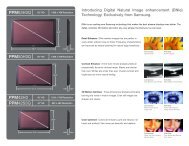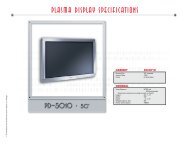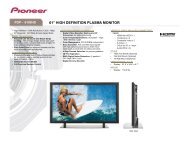Plasma Display - Plasma TV Buying Guide
Plasma Display - Plasma TV Buying Guide
Plasma Display - Plasma TV Buying Guide
You also want an ePaper? Increase the reach of your titles
YUMPU automatically turns print PDFs into web optimized ePapers that Google loves.
The Industry's Best Overall Picture Quality<br />
Technologies for Increasing Contrast and Gradation<br />
Stunning 4000:1 Dark-Area Contrast* —<br />
New Real Black Drive System<br />
By reducing the pre-discharge<br />
emission when reproducing<br />
black, the New Real Black<br />
Drive System provides deeper,<br />
richer blacks and a stunning<br />
4000:1 contrast*. The result is<br />
dramatically enhanced image<br />
clarity and realism.<br />
* For the SD models.<br />
Conventional<br />
Emission intensity<br />
Emission intensity<br />
Weak pre-discharge emissions × 12<br />
(Contrast: 550 : 1)<br />
1 field<br />
Strong pre-discharge emission × 1<br />
(Contrast: 400 :1)<br />
1 field<br />
Conventional<br />
Emission intensity<br />
Weak pre-discharge emission × 1<br />
(Contrast: 4000 :1)<br />
1 field<br />
Real Black Drive<br />
Even Higher Bright-Area Contrast —<br />
Deep Black Filter<br />
The front protective glass of the plasma display panel incorporates a<br />
Deep Black Filter that suppresses light transmittance and slashes the<br />
amount of external light reflected. This helps our displays achieve the<br />
industry's highest level of contrast when viewed in bright<br />
surroundings.<br />
2,048 Shades of Gradation in Dark Scenes —<br />
New Super Real Gamma System<br />
In scenes with low brightness levels, the New Super Real Gamma<br />
System reproduces gradation in steps equivalent to 2,048 shades. In<br />
other words, this original, non-linear signal processing system<br />
provides superior performance at brightness levels where the human<br />
eye sees best. As a result, it adds subtle nuances to darker scenes<br />
and gives images greater depth.<br />
New Super Real Gamma System<br />
Technologies for Increasing Brightness<br />
10% Brighter Images —<br />
New MACH Panel with Bounded Cell Structure<br />
The New MACH (Multifacet<br />
Asymmetrical<br />
Configuration Hyper-pixel)<br />
Panel features a bounded<br />
cell structure in which<br />
wall-like ribs are used to<br />
wrap each individual cell.<br />
By increasing the area in<br />
which the phosphor can<br />
be applied, this<br />
Conventional<br />
stripe rib structure<br />
New bounded cell<br />
structure<br />
dramatically improves both light-emitting efficiency and intensity.<br />
Furthermore, improvements to the drive circuit and plasma gas inside<br />
the panel have enabled Panasonic to boost peak brightness while<br />
actually lowering power consumption compared with our previous<br />
models. As a result, peak brightness is boosted by 10% compared<br />
with a previous Panasonic model.<br />
The new panel structure boasts a long service life of 60,000 hours*.<br />
A newly developed phosphor also raises the plasma displays'<br />
resistance to static-image screen burning to the same level as CRT<br />
displays.<br />
* The time until panel brightness is reduced to half its initial level. The service<br />
life given above is intended as a guideline when displaying standard moving<br />
images. However, this time varies depending on the content of the images<br />
displayed and the usage environment.<br />
High-Contrast Images with a High S/N Ratio —<br />
Adaptive AGC<br />
Our previous automatic gain control (AGC) detected the brightness<br />
level of the entire image, then boosted it as necessary. This had a<br />
drawback, in that it tended to increase noise and black-out parts of<br />
the image where the video signal did not require boosting. Adaptive<br />
AGC raises contrast while suppressing noise by detecting and<br />
boosting only the image edges.<br />
Note: The default setting for the Adaptive AGC is OFF.<br />
Conventional<br />
Conventional<br />
Adaptive AGC<br />
Technologies for Improving Picture Clarity and<br />
Colors<br />
Cleaner Moving Images —<br />
High-Precision MPD Noise Reduction<br />
This newly developed technology dramatically reduces MPD (Motion<br />
Picture Disturbance) noise to deliver crisp, clean moving images.<br />
Using a Panasonic original algorithm, it detects motion patterns that<br />
tend to generate noise and makes the necessary adjustments to<br />
maximize image quality. And it does this without diminishing the<br />
quality of stationary objects, such as those in the background.<br />
Conventional MPD Noise Reduction<br />
Vibrant Colors and Natural Skin Tones —<br />
3D Color Management System<br />
3D Color Management System is a new correction process that<br />
works in a three-dimensional color matrix (hue, saturation, and<br />
brightness) rather than the conventional two-dimensional color<br />
difference plane. By correcting hue and brightness independently and<br />
providing finer control, this process delivers vibrant colors and natural<br />
skin tones.<br />
Note: The default setting for the 3D Color Management System is OFF.<br />
Technologies for Enhancing Resolution and<br />
Sharpness<br />
Better Vertical Resolution — Active I/P Conversion<br />
The Active I/P (Interlace/Progressive) Conversion system detects<br />
slow movements more precisely by increasing the range for detecting<br />
moving-picture and still-picture pixels. This reduces I/P conversion<br />
noise that often occurs when reproducing tiny movements, thereby<br />
producing crisper images while raising the vertical resolution in<br />
interlaced images.<br />
Active I/P Conversion<br />
Functions that Improve Usability<br />
Two Different Images on One Screen —<br />
Dual Picture Mode<br />
You can simultaneously display images from any two different kinds of<br />
AV sources connected. Or, adding one of the optional terminal boards<br />
lets you display images from two of the same type of image source,<br />
such as two PCs or two DVD players. This function allows you to take<br />
full advantage of the plasma display's large screen.<br />
COMPONENT 1<br />
COMPONENT 2<br />
Picture-And-Picture mode splits<br />
the screen in half and shows<br />
different pictures on each half.<br />
COMPONENT 1<br />
COMPONENT 2<br />
Picture-Out-Picture mode displays<br />
a small picture on the right side of<br />
the screen.<br />
Up to 4x Enlargement of Image Zones —<br />
Digital Zoom<br />
This function lets you enlarge a portion of<br />
an image by up to four times normal size<br />
and display it on the full screen. Use this<br />
function to give your presentations greater<br />
impact.<br />
1x<br />
* Digital Zoom does not work in Dual Picture<br />
mode. Images of SXGA resolution or higher<br />
from a PC or RGB source may not enlarge<br />
correctly. Some degradation occurs when<br />
images are enlarged.<br />
COMPONENT 1<br />
COMPONENT 2<br />
Picture-In-Picture mode<br />
superimposes a small sub-screen<br />
picture over a full-screen picture.<br />
Huge <strong>Display</strong> Equivalent to 260-inches —<br />
Multi-Screen Applications<br />
The built-in image-enlarging function makes it easier to set up multiscreen<br />
displays featuring four (2 x 2), nine (3 x 3), or sixteen (4 x 4)<br />
units. For example, with sixteen 65-inch displays you can configure a<br />
huge display equivalent to 260 inches by simply connecting ordinary<br />
cables. That's the kind of display that catches eyes at shopping malls<br />
and event sites. This function works with component video signals, so<br />
you can use enlarged images from DVD and other high-quality<br />
sources in your<br />
display.<br />
* The image-enlarging<br />
function operates on<br />
video signal and on<br />
PC/RGB signal up to<br />
XGA mode. However,<br />
a normal display may<br />
not be obtained with<br />
some PC/RGB<br />
signals.<br />
Note: The ambient temperature varies depending on the installation location.<br />
Provide sufficient air conditioning for surrounding conditions.<br />
4 5<br />
2x<br />
3x<br />
4x<br />
Enhanced Screen Saver Functions<br />
A variety of screen saver functions help minimize the risk of uneven<br />
phosphor aging. You can also use the timer to set the screen saver<br />
operating cycles, operating time, and start and stop times. This lets<br />
you make settings that match your application.<br />
• White Bar Scroll: White bars move across the screen from left to<br />
right at regular intervals. Good for ordinary still-image displays.<br />
• Screen Reversal:<br />
<strong>Display</strong>s images<br />
with the black and<br />
white reversed.<br />
Good for text<br />
displays.<br />
• Side Panel Adjustment:<br />
Brightens the black<br />
bands on the sides<br />
of the screen when<br />
displaying images<br />
in the 4:3 format.<br />
• Wobbling: Shifts the image's position by several pixels at fixed<br />
time intervals.<br />
• Peak Limit Mode: Lowers the peak brightness level<br />
(image contrast) by 30%.<br />
Energy-Saving Functions<br />
A broad range of environment-friendly functions help minimize energy<br />
consumption.<br />
• DPMS (<strong>Display</strong> Power Management Signaling)<br />
Power is automatically turned on or off in response to a sync signal<br />
from the PC connected to the built-in PC input terminal.<br />
• Auto Power Off<br />
When you're using a device connected to the multi-function slots,<br />
the display panel goes into standby mode after about 10 minutes if<br />
no sync signal is received.<br />
• Power Save Mode<br />
Reduces the display's brightness.<br />
• Standby Power Save Mode<br />
Reduces power consumption when on standby. (Start-up may take a<br />
few moments once the display is in this mode.)<br />
Front Button Control<br />
The five buttons on the front bezel give you<br />
instant access to all major functions via an<br />
easy-to-read on-screen menu display.<br />
Fan-Less Quiet Operation<br />
Our "silence engineering" has eliminated the<br />
need for a fan — and fan noise — giving you the kind of quiet<br />
operation that makes for a more pleasant viewing experience.<br />
(TH-65PHD7 and TH-50PHD7 feature a noise-suppressing silence design.)<br />
Vertical Mounting<br />
Panasonic plasma display can be<br />
positioned vertically to display<br />
portrait images and can serve as<br />
an effective storefront electronic<br />
signboard.<br />
• Optional Fan Kit for Vertical<br />
Mounting Applications<br />
TY-UPK50HV7 (for TH-50PHD7)<br />
TY-UPK42HV7 (for TH-42PHD7)<br />
* Operating temperature: 32 to 95°F



